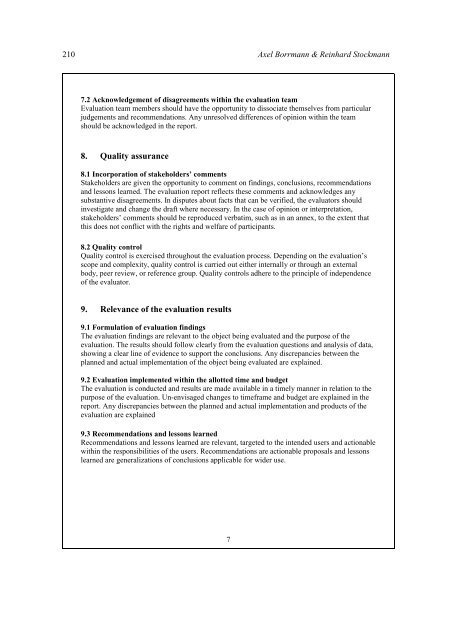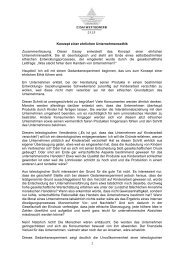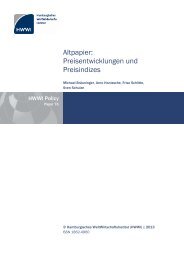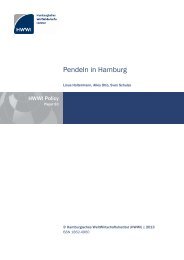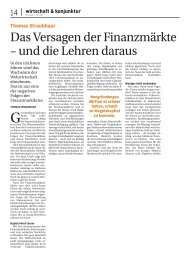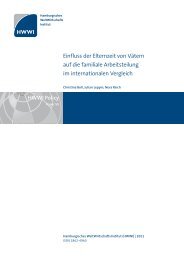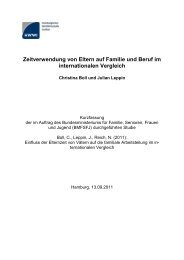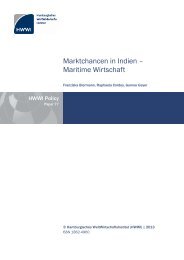Evaluation in der deutschen Entwicklungszusammenarbeit - HWWI
Evaluation in der deutschen Entwicklungszusammenarbeit - HWWI
Evaluation in der deutschen Entwicklungszusammenarbeit - HWWI
Sie wollen auch ein ePaper? Erhöhen Sie die Reichweite Ihrer Titel.
YUMPU macht aus Druck-PDFs automatisch weboptimierte ePaper, die Google liebt.
210 Axel Borrmann & Re<strong>in</strong>hard Stockmann<br />
7.2 Acknowledgement of disagreements with<strong>in</strong> the evaluation team<br />
<strong>Evaluation</strong> team members should have the opportunity to dissociate themselves from particular<br />
judgements and recommendations. Any unresolved differences of op<strong>in</strong>ion with<strong>in</strong> the team<br />
should be acknowledged <strong>in</strong> the report.<br />
8. Quality assurance<br />
8.1 Incorporation of stakehol<strong>der</strong>s’ comments<br />
Stakehol<strong>der</strong>s are given the opportunity to comment on f<strong>in</strong>d<strong>in</strong>gs, conclusions, recommendations<br />
and lessons learned. The evaluation report reflects these comments and acknowledges any<br />
substantive disagreements. In disputes about facts that can be verified, the evaluators should<br />
<strong>in</strong>vestigate and change the draft where necessary. In the case of op<strong>in</strong>ion or <strong>in</strong>terpretation,<br />
stakehol<strong>der</strong>s’ comments should be reproduced verbatim, such as <strong>in</strong> an annex, to the extent that<br />
this does not conflict with the rights and welfare of participants.<br />
8.2 Quality control<br />
Quality control is exercised throughout the evaluation process. Depend<strong>in</strong>g on the evaluation’s<br />
scope and complexity, quality control is carried out either <strong>in</strong>ternally or through an external<br />
body, peer review, or reference group. Quality controls adhere to the pr<strong>in</strong>ciple of <strong>in</strong>dependence<br />
of the evaluator.<br />
9. Relevance of the evaluation results<br />
9.1 Formulation of evaluation f<strong>in</strong>d<strong>in</strong>gs<br />
The evaluation f<strong>in</strong>d<strong>in</strong>gs are relevant to the object be<strong>in</strong>g evaluated and the purpose of the<br />
evaluation. The results should follow clearly from the evaluation questions and analysis of data,<br />
show<strong>in</strong>g a clear l<strong>in</strong>e of evidence to support the conclusions. Any discrepancies between the<br />
planned and actual implementation of the object be<strong>in</strong>g evaluated are expla<strong>in</strong>ed.<br />
9.2 <strong>Evaluation</strong> implemented with<strong>in</strong> the allotted time and budget<br />
The evaluation is conducted and results are made available <strong>in</strong> a timely manner <strong>in</strong> relation to the<br />
purpose of the evaluation. Un-envisaged changes to timeframe and budget are expla<strong>in</strong>ed <strong>in</strong> the<br />
report. Any discrepancies between the planned and actual implementation and products of the<br />
evaluation are expla<strong>in</strong>ed<br />
9.3 Recommendations and lessons learned<br />
Recommendations and lessons learned are relevant, targeted to the <strong>in</strong>tended users and actionable<br />
with<strong>in</strong> the responsibilities of the users. Recommendations are actionable proposals and lessons<br />
learned are generalizations of conclusions applicable for wi<strong>der</strong> use.<br />
7


